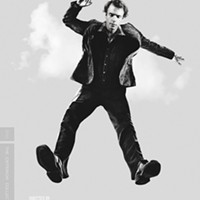[
{
"name": "Top Stories Video Pair",
"insertPoint": "7",
"component": "17087298",
"parentWrapperClass": "fdn-ads-inline-content-block",
"requiredCountToDisplay": "1"
}
]
Book by Luc Sante
YETI Books
Sixteen years ago Luc Sante's first book, Low Life: Lures and Snares of Old New York, explored the the sheer weirdness and teeming danger of life on the Lower East Side of Manhattan in the 19th and early 20th century, conducting a vividly impressionistic tour of a world of drug dens, street gangs and racial strife that was at once arcane and oddly contemporary. Sante, for whom English is a second language (he was born and raised in Belgium until he was 10), is a concise stylist who rarely wastes a word. His aesthetic, as Greil Marcus points out in his introduction, is that of a hard-boiled surrealist open to strange juxtapositions of culture, and he prefers less traveled historical byways.
In his new essay collection, Kill Your Darlings (the title is from an apocryphal remark by William Faulkner about the ruthlessness required of good writing), he shows himself to be the kind of wide-ranging writer who can find interest in disparate subjects such as Victor Hugo, Buddy Bolden, Tintin and the '60s garage rock of the Nuggets collection. He avoids numb academic "expert" approaches for the enthusiasms of a dilettante — though he's a dilettante with a taste for unearthing lost histories, marginal figures and underdogs.
It's not all just cultural criticism though: His fragments of autobiography in the book compliment the more heady essays. Sante revisits his high school stint as a worker in a hellish plastics factory, a job where he read snippets of Celine between cycles of mind-destroying work and writes encomiums to his poetic heroes Allen Ginsberg and Rimbaud with a self-deprecating eye toward his earlier self, who had pretensions to be their successor. He delivers a satisfying coup de grace to the last vestiges of the cobwebbed myth of Woodstock, seeing the roots of the greed and sexual violence pervading the '90s cash-in version of the festival prefigured in the original. He's particularly good in a piece breaking down Bob Dylan's method of songwriting, which he claims is a mix of traditional ready-made lyrics and original material. He appreciates Dylan's recent memoir for being "open to currents that run up and down the ages outside the confines of the popular culture of any given period."
Sante is similarly open to echoes and rhymes over time, and likes nothing better than excavating a word, an idea or a place through the accumulated layers of history. His etymological essay on the word "dope" uses the word to entertainingly sketch the country's history and mores in miniature, and is a case study of lexical flexibility of American English. "The Invention of the Blues" is an essay on the origins of American music that punctures some of the tidy myths of blues iconography. Sante describes the blues as a peculiarly modern invention uniquely suited for the early mass media of the radio and phonograph, and argues that the folk element has been overemphasized by early paternalistic scholars such as Alan Lomax, who preferred a sentimentalized view of "the people."
Perhaps the best piece in the collection is his positively sinful and seductive paean to the subtle erotic gestures of cigarette smoking, "Our Friend the Cigarette." It actually made this non-smoker want to light one up, and should probably be suppressed for the common good. This book is a varied collection that shows once again that the clearest view sometimes comes from the margins and displays the art of the essay at its best.
Speaking of Review
-

Hungry For Love
Dec 3, 2020 -

HSU Independent Review of UPD 'Uncovered Organizational Issues' Within the Department
Jun 17, 2020 -

And Everything is Going Fine
Nov 28, 2013 - More »
more from the author
-
Going Clear: Scientology, Hollywood and the Prison of Belief
By Lawrence Wright - Knopf
- Mar 28, 2013
-
Best Books: 2012
- Dec 27, 2012
-
Telegraph Avenue
By Michael Chabon - Harper
- Oct 4, 2012
- More »
































